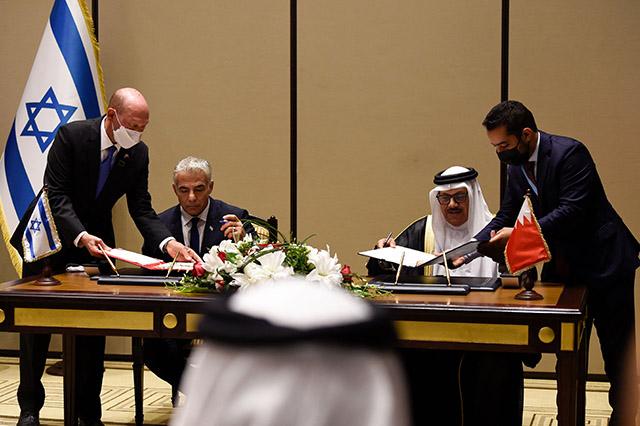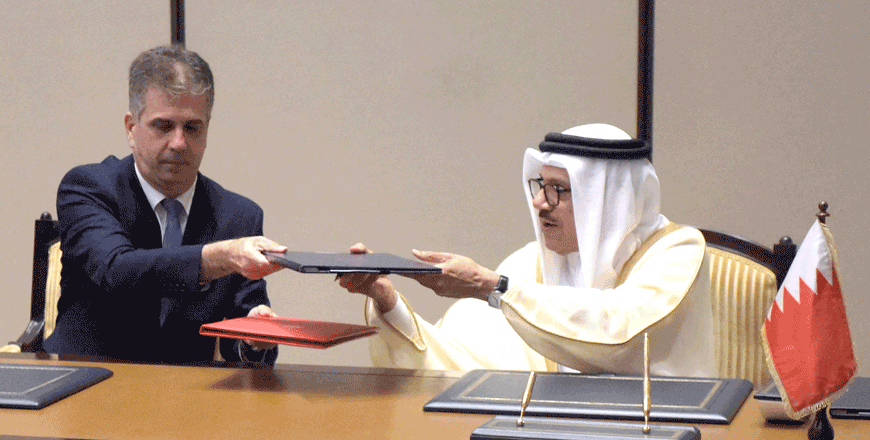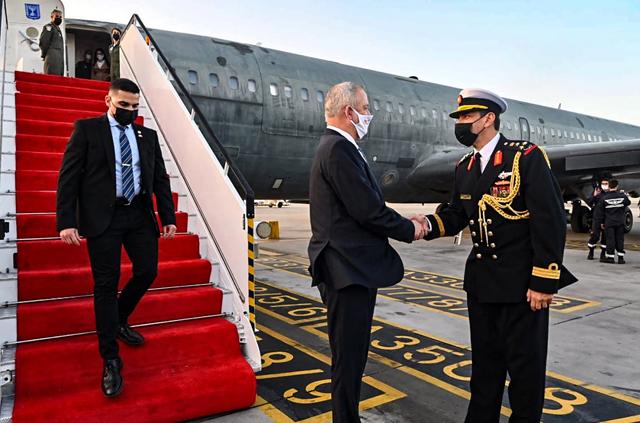You are here
Israel foreign minister makes landmark visit to Bahrain
By AFP - Sep 30,2021 - Last updated at Sep 30,2021

Bahrain's Foreign Minister Abdullatif Al Zayani (right) and his Israeli counterpart Yair Lapid sign agreements between their countries in the Bahraini capital Manama, on Thursday
MANAMA -- Israel's top diplomat Yair Lapid began a landmark visit on Thursday to Bahrain where he will open the Israeli embassy one year after the US-brokered diplomatic ties.
The Israeli foreign minister touched down at Manama airport over an hour before a Gulf Air A320 took off in the opposite direction for the first commercial flight between the two countries.
Crew members waved the flags of Bahrain and Israel from cockpit windows of the passenger jet when it landed later at Ben Gurion airport near Tel Aviv.
The Bahrain flight and Israel's first bilateral ministerial visit to the Gulf country are part of a thaw in regional relations after the United Arab Emirates, Morocco and Sudan also agreed last year to establish ties with Israel under agreements known as the Abraham Accords.
Lapid met with King Hamad Bin Isa Al Khalifa, in what Israeli media said was the first public meeting of a Gulf monarch with an Israeli official.
The Israeli top diplomat also met with Crown Prince Sheikh Salman Bin Hamad Al Khalifa and Foreign Minister Abdullatif Al Zayani.
"We talked about the cooperation between our countries and about taking the official peace between us and turning it into an active, economic, security, political and civic friendship," Lapid tweeted following his sit-down with Zayani.
Two-state solution
Zayani and Lapid also held a news conference, during which they signed a number of memorandums of understanding -- ranging from cooperation in environment conservation to sports.
"Your visit builds on the considerable progress we have already made... and underlines once again our shared desire to spread peace, stability, and cooperation across the Middle East and achieve genuine and lasting security and prosperity for its peoples," said Zayani.
Zayani also said Bahrain reaffirmed its commitment to the two-state solution to the Israeli-Palestinian conflict.
Lapid said that he too was "a devoted supporter of the two-state solution" but stressed he was not speaking on behalf of the government.
"I think it's the right solution for the people of Israel and the Palestinians as well. Not everyone in our government thinks the same," he said.
He also said that the opening of embassies "will symbolise diplomatic cooperation between us".
Anger simmers in some quarters over the accords, which broke with decades of Arab consensus that there would be no relations with Israel while the Palestinian question remains unresolved.
Protesters burned tyres on the outskirts of Manama early Thursday, sending clouds of black smoke into the air, and the hashtag #BahrainRejectsZionists in Arabic was circulating on social media.
Extra security was stationed on the route to the airport and no Israeli flags were visible on main roads. Opposition activists have called for further protests later on Thursday.
"The visit of the Israeli FM to Bahrain is an act firmly rejected, condemned and denounced by the people of Bahrain," Sheikh Hussein Al Daih, deputy secretary-general of the opposition Al Wefaq National Islamic Society, told AFP on Wednesday.
'Peaceful diplomacy'
The Arab countries involved in the Abraham Accords have stressed the economic benefits of ties with Israel, with half a billion dollars in trade already reported with the UAE.
The UAE, Bahrain and Morocco became the first Arab states in decades to normalise relations with Israel last year, following negotiations spearheaded by former US president Donald Trump.
Israel had earlier reached peace treaties with neighbouring Egypt and Jordan.
On the first anniversary of the accords this month, US Secretary of State Antony Blinken pledged to continue the efforts of the Trump government.
"This administration will continue to build on the successful efforts of the last administration to keep normalisation marching forward," Blinken said.
"We will encourage more countries to follow the lead of the Emirates, Bahrain and Morocco. We want to widen the circle of peaceful diplomacy."
Related Articles
MANAMA — Israel and Bahrain cemented Sunday a deal officially establishing relations and signed several memorandums of understanding.An Isra
MANAMA — Israel's foreign minister agreed on Monday with his Bahraini counterpart to boost trade relations, during his first visit to one of
OCCUPIED JERUSALEM — Israeli Defence Minister Benny Gantz landed in Bahrain on Wednesday, the latest high-profile diplomatic trip since the

















